30 June 2025

30 June 2025
Terrorists committing inhumane acts have been engaging in battles, firing heavy weapons and improvised rockets and dropping bombs using drones into the residential areas, including towns, wards and villages.
Since they are conducting such terrorist acts, on 28 June 2025 at 6:20 PM, a so-called PDF terrorist group carried out an attack by dropping bombs on Lat Sal Village in Seikphyu Township of Magway Region. The bombs exploded within the village. As a result, Ma Myo Myat Ei (15 years old), a resident of the village, sustained shrapnel injuries and was transported to Seikphyu Township Public Hospital for medical treatment.
Due to the heinous acts of armed terrorists such as firing of heavy and small weapons and dropping bombs using drones within wards and villages and planting mines in public areas, innocent civilians have been killed or injured. Consequently, local residents are protesting vehemently against these acts of terrorism, completely refusing to accept them. Security personnel are intensifying necessary security measures in collaboration with the local residents, it is reported.
MOHA
30 June 2025
Terrorists committing inhumane acts have been engaging in battles, firing heavy weapons and improvised rockets and dropping bombs using drones into the residential areas, including towns, wards and villages.
Since they are conducting such terrorist acts, on 28 June 2025 at 6:20 PM, a so-called PDF terrorist group carried out an attack by dropping bombs on Lat Sal Village in Seikphyu Township of Magway Region. The bombs exploded within the village. As a result, Ma Myo Myat Ei (15 years old), a resident of the village, sustained shrapnel injuries and was transported to Seikphyu Township Public Hospital for medical treatment.
Due to the heinous acts of armed terrorists such as firing of heavy and small weapons and dropping bombs using drones within wards and villages and planting mines in public areas, innocent civilians have been killed or injured. Consequently, local residents are protesting vehemently against these acts of terrorism, completely refusing to accept them. Security personnel are intensifying necessary security measures in collaboration with the local residents, it is reported.
MOHA

Under the supervision of the Illegal Trade Eradication Steering Committee, effective legal action is taken to combat illegal trade across Myanmar.
Under the supervision of the Illegal Trade Eradication Steering Committee, effective legal action is taken to combat illegal trade across Myanmar.
On 27 June, a combined task force under the management of the Mandalay Region Illegal Trade Eradication Task Force conducted inspections at the Yatanabon Bridge (Mandalay) checkpoint. They intercepted a vehicle travelling from Shwebo to Yangon and seized consumer goods worth approximately K2.025 million without proper documentation, along with a Scania bus used in the transport valued at K100 million. The total estimated value of the seizure was K102.025 million. Action is taken in accordance with Customs procedures.
Similarly, under the Bago Region task force’s management, a combined team carried out inspections near the Nyaungkhashay X-Ray checkpoint. A vehicle heading from Hpa-an to Yangon was found transporting foodstuffs worth approximately K5.11 million without proper documentation. Authorities also seized the Yutong bus used for the transport, valued at K30 million. The total estimated value was K35.11 million, and action is taken in line with Customs procedures.
On 28 June, a combined team under the Taninthayi Region Illegal Trade Eradication Task Force inspected a warehouse located at No 3, Ywama Road, Shwehintha Ward in Kawthoung. They discovered industrial materials worth approximately K41.9 million without valid documentation. Appropriate legal action is taken.
According to records from Myanmar Police Force under the Ministry of Home Affairs on 28 June, authorities seized eight unregistered vehicles and 31 unregistered motorcycles. These are handled in accordance with relevant laws and procedures.
Altogether, five cases with an estimated value of K179.036 million were seized on 27 and 28 June. — MNA/KZL
Source: GNLM
Under the supervision of the Illegal Trade Eradication Steering Committee, effective legal action is taken to combat illegal trade across Myanmar.
On 27 June, a combined task force under the management of the Mandalay Region Illegal Trade Eradication Task Force conducted inspections at the Yatanabon Bridge (Mandalay) checkpoint. They intercepted a vehicle travelling from Shwebo to Yangon and seized consumer goods worth approximately K2.025 million without proper documentation, along with a Scania bus used in the transport valued at K100 million. The total estimated value of the seizure was K102.025 million. Action is taken in accordance with Customs procedures.
Similarly, under the Bago Region task force’s management, a combined team carried out inspections near the Nyaungkhashay X-Ray checkpoint. A vehicle heading from Hpa-an to Yangon was found transporting foodstuffs worth approximately K5.11 million without proper documentation. Authorities also seized the Yutong bus used for the transport, valued at K30 million. The total estimated value was K35.11 million, and action is taken in line with Customs procedures.
On 28 June, a combined team under the Taninthayi Region Illegal Trade Eradication Task Force inspected a warehouse located at No 3, Ywama Road, Shwehintha Ward in Kawthoung. They discovered industrial materials worth approximately K41.9 million without valid documentation. Appropriate legal action is taken.
According to records from Myanmar Police Force under the Ministry of Home Affairs on 28 June, authorities seized eight unregistered vehicles and 31 unregistered motorcycles. These are handled in accordance with relevant laws and procedures.
Altogether, five cases with an estimated value of K179.036 million were seized on 27 and 28 June. — MNA/KZL
Source: GNLM
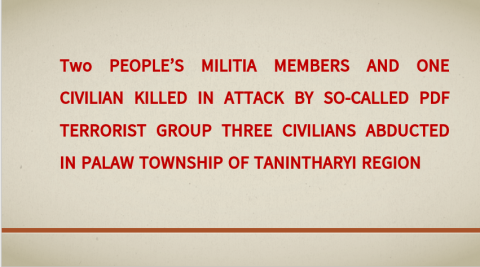
30 June 2025
Terrorists committing inhumane acts have been engaging in battles, firing heavy weapons and improvised rockets and dropping bombs using drones into the residential areas, including towns, wards and villages.
30 June 2025
Terrorists committing inhumane acts have been engaging in battles, firing heavy weapons and improvised rockets and dropping bombs using drones into the residential areas, including towns, wards and villages.
Since they are conducting such terrorist acts, on 27 June 2025 at 5:00 AM, when a so-called PDF terrorist group attacked Kyauk Kaw Village in Palaw Township of Tanintharyi Region, using small firearms. In response, members of the People’s Militia crossed fire, forcing the terrorists to retreat. During the incident, two members of the People’s Militia: U Maung Maung and U Naing Naing (aka) U Hla Naing and a villager, U Shwe Myint (68 years old), were killed on the spot. Additionally, U Win Hlaing (51 years old), U Min Oo and Daw Me Me Kyaw (38 years old) were abducted by the terrorists whem they retreat.
The security personnel are investigating the culprits of the acts of terrorism from the above incident to take effective action in accordance with the law.
MOHA
30 June 2025
Terrorists committing inhumane acts have been engaging in battles, firing heavy weapons and improvised rockets and dropping bombs using drones into the residential areas, including towns, wards and villages.
Since they are conducting such terrorist acts, on 27 June 2025 at 5:00 AM, when a so-called PDF terrorist group attacked Kyauk Kaw Village in Palaw Township of Tanintharyi Region, using small firearms. In response, members of the People’s Militia crossed fire, forcing the terrorists to retreat. During the incident, two members of the People’s Militia: U Maung Maung and U Naing Naing (aka) U Hla Naing and a villager, U Shwe Myint (68 years old), were killed on the spot. Additionally, U Win Hlaing (51 years old), U Min Oo and Daw Me Me Kyaw (38 years old) were abducted by the terrorists whem they retreat.
The security personnel are investigating the culprits of the acts of terrorism from the above incident to take effective action in accordance with the law.
MOHA
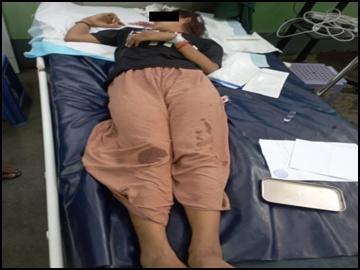
30 June 2025
Terrorists committing inhumane acts have been engaging in battles, firing heavy weapons and improvised rockets and dropping bombs using drones into the residential areas, including towns, wards and villages.
30 June 2025
Terrorists committing inhumane acts have been engaging in battles, firing heavy weapons and improvised rockets and dropping bombs using drones into the residential areas, including towns, wards and villages.
Since they are conducting such terrorist acts, on 27 June 2025 at 11:30 AM, when a so-called PDF terrorist group attacked Bagan Tu Village in Sagaing Township of Sagaing Region, using small firearms. In response, security personnel returned fire, forcing the group to retreat. During the incident, Ma Tha Zin Win (16 years old) and resident of the village, sustained gunshot wounds from the terrorists fire and was transported to Mandalay Public Hospital for medical treatment.
The security personnel are investigating the culprits of the acts of terrorism from the above incident to take effective action in accordance with the law.
MOHA
30 June 2025
Terrorists committing inhumane acts have been engaging in battles, firing heavy weapons and improvised rockets and dropping bombs using drones into the residential areas, including towns, wards and villages.
Since they are conducting such terrorist acts, on 27 June 2025 at 11:30 AM, when a so-called PDF terrorist group attacked Bagan Tu Village in Sagaing Township of Sagaing Region, using small firearms. In response, security personnel returned fire, forcing the group to retreat. During the incident, Ma Tha Zin Win (16 years old) and resident of the village, sustained gunshot wounds from the terrorists fire and was transported to Mandalay Public Hospital for medical treatment.
The security personnel are investigating the culprits of the acts of terrorism from the above incident to take effective action in accordance with the law.
MOHA
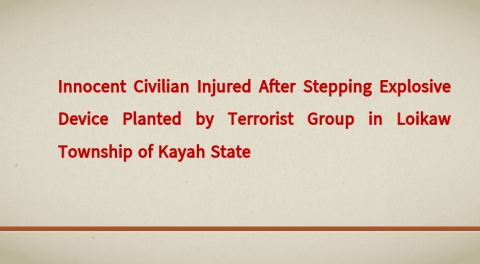
30 June 2025
In order to cause injuries to both peaceable civilians and administrative authorities who are striving to restore the rule of law, extreme terrorists provide financial assistance and instigate destructive activities, such as detonating explosive devices and remote blasting, against public roads, railways, government offices and houses.
30 June 2025
In order to cause injuries to both peaceable civilians and administrative authorities who are striving to restore the rule of law, extreme terrorists provide financial assistance and instigate destructive activities, such as detonating explosive devices and remote blasting, against public roads, railways, government offices and houses.
Since they are conducting such terrorist acts, on 24 June 2025 at 10:45 AM, a report stated that an explosion had occurred in Naung Yar (Ka Gyi) Ward, Loikaw Township of Kayah State. When security personnel arrived at the scene for further investigation, they discovered that U Yan Lin Myint (43 years old), a resident of the ward, had stepped on an explosive device planted in his yard by a terrorist group. The device exploded, causing him to sustain shrapnel injuries. He was transported to Loikaw Township Public Hospital for medical treatment.
The security personnel are investigating the culprits of the acts of terrorism from the above incident to take effective action in accordance with the law.
MOHA
30 June 2025
In order to cause injuries to both peaceable civilians and administrative authorities who are striving to restore the rule of law, extreme terrorists provide financial assistance and instigate destructive activities, such as detonating explosive devices and remote blasting, against public roads, railways, government offices and houses.
Since they are conducting such terrorist acts, on 24 June 2025 at 10:45 AM, a report stated that an explosion had occurred in Naung Yar (Ka Gyi) Ward, Loikaw Township of Kayah State. When security personnel arrived at the scene for further investigation, they discovered that U Yan Lin Myint (43 years old), a resident of the ward, had stepped on an explosive device planted in his yard by a terrorist group. The device exploded, causing him to sustain shrapnel injuries. He was transported to Loikaw Township Public Hospital for medical treatment.
The security personnel are investigating the culprits of the acts of terrorism from the above incident to take effective action in accordance with the law.
MOHA
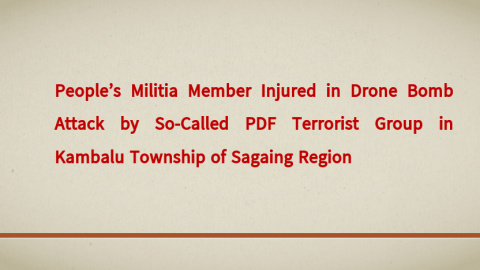
30 June 2025
Terrorists committing inhumane acts have been engaging in battles, firing heavy weapons and improvised rockets and dropping bombs using drones into the residential areas, including towns, wards and villages.
30 June 2025
Terrorists committing inhumane acts have been engaging in battles, firing heavy weapons and improvised rockets and dropping bombs using drones into the residential areas, including towns, wards and villages.
Since they are conducting such terrorist acts, on 27 June 2025 at 7:00 AM, a combined group comprising security personnel and People’s Militia members was conducting a patrol near Nat Taung Village in Kambalu Township of Sagaing Region. At the time, a so-called PDF terrorist group attacked by dropping bombs on the group. As a result, a member of People’s Militia, U Zaw Myo Htet (27 years old), sustained shrapnel injuries. He is currently receiving medical treatment from a medic of military corp.
The security personnel are investigating the culprits of the acts of terrorism from the above incident to take effective action in accordance with the law.
MOHA
30 June 2025
Terrorists committing inhumane acts have been engaging in battles, firing heavy weapons and improvised rockets and dropping bombs using drones into the residential areas, including towns, wards and villages.
Since they are conducting such terrorist acts, on 27 June 2025 at 7:00 AM, a combined group comprising security personnel and People’s Militia members was conducting a patrol near Nat Taung Village in Kambalu Township of Sagaing Region. At the time, a so-called PDF terrorist group attacked by dropping bombs on the group. As a result, a member of People’s Militia, U Zaw Myo Htet (27 years old), sustained shrapnel injuries. He is currently receiving medical treatment from a medic of military corp.
The security personnel are investigating the culprits of the acts of terrorism from the above incident to take effective action in accordance with the law.
MOHA
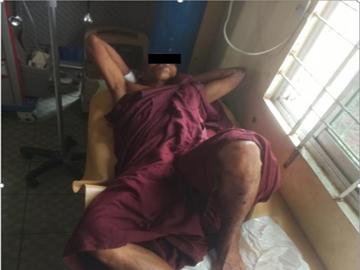
30 June 2025
In order to cause injuries to both peaceable civilians and administrative authorities who are striving to restore the rule of law, extreme terrorists provide financial assistance and instigate destructive activities, such as detonating explosive devices and remote blasting, against public roads, railways, government offices and houses.
Since they are conducting such terrorist acts, on 28 June 2025 at 9:30 AM, a report stated that a monk with shrapnel injuries was admitted to the Salin Township Public Hospital of Magway Region. When security personnel arrived at the hospital for further investigation, the victim was identified as a monk named Ku Mar Ra (aka) U Kyaw Yin (42 years old) with three years as monkhood, from Kyaik Htee Yoe Taw Ya Monastery in Htoo Pauk Village in Salin Township. The incident occurred when the monk had stepped on an explosive device planted near the monastery by a so-called PDF terrorist group. The device exploded, causing him to sustain shrapnel injuries.
The security personnel are investigating the culprits of the acts of terrorism from the above incident to take effective action in accordance with the law.
MOHA
30 June 2025
In order to cause injuries to both peaceable civilians and administrative authorities who are striving to restore the rule of law, extreme terrorists provide financial assistance and instigate destructive activities, such as detonating explosive devices and remote blasting, against public roads, railways, government offices and houses.
Since they are conducting such terrorist acts, on 28 June 2025 at 9:30 AM, a report stated that a monk with shrapnel injuries was admitted to the Salin Township Public Hospital of Magway Region. When security personnel arrived at the hospital for further investigation, the victim was identified as a monk named Ku Mar Ra (aka) U Kyaw Yin (42 years old) with three years as monkhood, from Kyaik Htee Yoe Taw Ya Monastery in Htoo Pauk Village in Salin Township. The incident occurred when the monk had stepped on an explosive device planted near the monastery by a so-called PDF terrorist group. The device exploded, causing him to sustain shrapnel injuries.
The security personnel are investigating the culprits of the acts of terrorism from the above incident to take effective action in accordance with the law.
MOHA
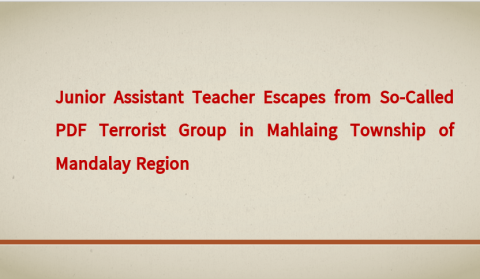
30 June 2025
30 June 2025
Terrorist groups have been engaging in battles, carrying out attacks using heavy weapons, drones to drop bombs and improvised explosive devices across towns and villages in various states and regions. Moreover, they are committing inhumane acts of terror and criminal activities including abducting and extorting money from civil servant’s families and local civilians, as well as killings. Since they are conducting such terrorist acts, on 23 June 2025 at 10:40 AM, U Myo Myint (27 years old), a junior assistant teacher of the Basic Education Primary School in Myit Kyin Village, a resident of Yae Hwat Village in Mahlaing Township of Mandalay Region, was forcibly abducted by a so-called PDF terrorist. On 27 June 2025 at 6:30 AM, the so-called PDF terrorists released him in an apparent to spread fear among the educational community. The abducted teacher returned home, it is reported. Regarding the above incident, security personnel are continuing necessary operations in accordance with standard procedures to identify, apprehend and take action against the terrorists involved, it is reported.
MOHA
30 June 2025
Terrorist groups have been engaging in battles, carrying out attacks using heavy weapons, drones to drop bombs and improvised explosive devices across towns and villages in various states and regions. Moreover, they are committing inhumane acts of terror and criminal activities including abducting and extorting money from civil servant’s families and local civilians, as well as killings. Since they are conducting such terrorist acts, on 23 June 2025 at 10:40 AM, U Myo Myint (27 years old), a junior assistant teacher of the Basic Education Primary School in Myit Kyin Village, a resident of Yae Hwat Village in Mahlaing Township of Mandalay Region, was forcibly abducted by a so-called PDF terrorist. On 27 June 2025 at 6:30 AM, the so-called PDF terrorists released him in an apparent to spread fear among the educational community. The abducted teacher returned home, it is reported. Regarding the above incident, security personnel are continuing necessary operations in accordance with standard procedures to identify, apprehend and take action against the terrorists involved, it is reported.
MOHA
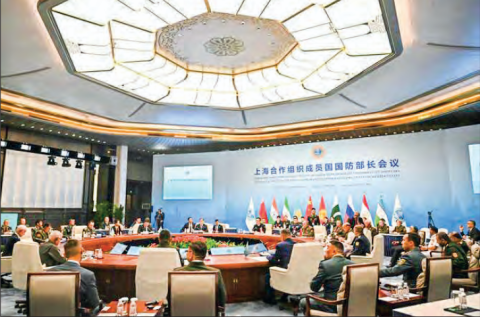
THE military-political situation in the world is deteriorating, the potential for conflict is growing dangerously, Russian Defence Minister Andrei Belousov said on Thursday.
THE military-political situation in the world is deteriorating, the potential for conflict is growing dangerously, Russian Defence Minister Andrei Belousov said on Thursday.
“The current military-political situation in the world remains complex and tends to deteriorate. Geopolitical contradictions have intensified. The fundamental foundations of strategic stability are being destroyed. The potential for conflict has increased threateningly. Against this background, the role of international institutions designed to ensure global stability has fallen to an unacceptable level,” Belousov said, addressing the a meeting of heads of the Shanghai Cooperation Organization (SCO) member countries’ defence ministries.
Numerous hotbeds of instability are being created in the world, including in the SCO and along its perimeter, the minister added.
Prolonging military operations by supplying Kyiv with Western weapons threatens to destabilize the situation in Europe, Andrei Belousov said. — SPUTNIK
Source: GNLM
THE military-political situation in the world is deteriorating, the potential for conflict is growing dangerously, Russian Defence Minister Andrei Belousov said on Thursday.
“The current military-political situation in the world remains complex and tends to deteriorate. Geopolitical contradictions have intensified. The fundamental foundations of strategic stability are being destroyed. The potential for conflict has increased threateningly. Against this background, the role of international institutions designed to ensure global stability has fallen to an unacceptable level,” Belousov said, addressing the a meeting of heads of the Shanghai Cooperation Organization (SCO) member countries’ defence ministries.
Numerous hotbeds of instability are being created in the world, including in the SCO and along its perimeter, the minister added.
Prolonging military operations by supplying Kyiv with Western weapons threatens to destabilize the situation in Europe, Andrei Belousov said. — SPUTNIK
Source: GNLM
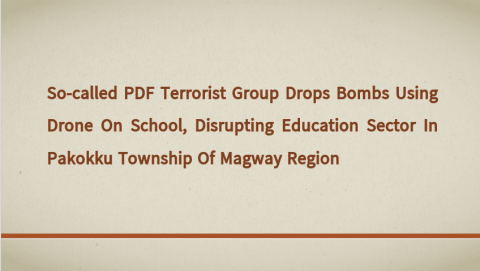
25 June 2025
Terrorist groups are committing inhumane acts with the intent to disrupt the education system, which is dedicated to improving and advancing children's learning. These acts include the destruction of school textbooks and stationery, the intimidation and abduction of education staff and students, targeted killings, the planting of explosive devices, fired heavy weapons, dropping bombs using drone, to destroy educational buildings and sending threatening letters to the teachers.
Since they are conducting such terrorist acts, on 24 June 2025 at 8:30 PM, a so-called PDF terrorist group carried out an attack by dropping bombs using a drone on the Basic Education Primary School in Myo Soe Village, Pakokku Township of Magway Region. The bombs exploded within the school compound. As a result of the explosions, a kindergarten classroom building was damaged. The school currently has five female teachers and 23 students, it is reported.
It has been reported that the security personnel are investigating the culprits of the acts of terrorism from the above incident to take effective action in accordance with the law.
MOHA
25 June 2025
Terrorist groups are committing inhumane acts with the intent to disrupt the education system, which is dedicated to improving and advancing children's learning. These acts include the destruction of school textbooks and stationery, the intimidation and abduction of education staff and students, targeted killings, the planting of explosive devices, fired heavy weapons, dropping bombs using drone, to destroy educational buildings and sending threatening letters to the teachers.
Since they are conducting such terrorist acts, on 24 June 2025 at 8:30 PM, a so-called PDF terrorist group carried out an attack by dropping bombs using a drone on the Basic Education Primary School in Myo Soe Village, Pakokku Township of Magway Region. The bombs exploded within the school compound. As a result of the explosions, a kindergarten classroom building was damaged. The school currently has five female teachers and 23 students, it is reported.
It has been reported that the security personnel are investigating the culprits of the acts of terrorism from the above incident to take effective action in accordance with the law.
MOHA

